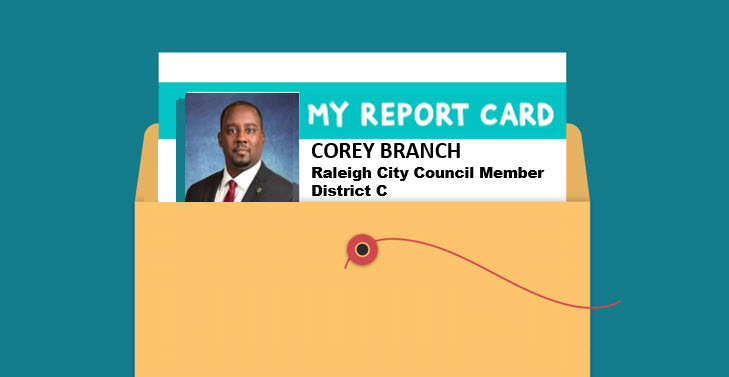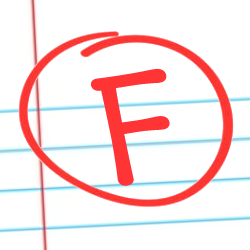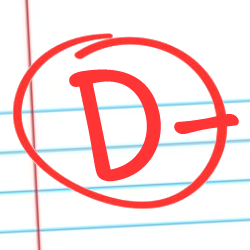
Corey Branch : District C – 2022
Rising Cost of Living
- The cost of gas, food and housing in Raleigh is rising much faster than incomes, forcing families with service wages and fixed incomes out of Raleigh. Since 2019, Branch has raised Raleigh taxes by 22% while increasing Council pay and benefits 82%. [1]
Civic Engagement & Grassroots Democracy
- In one of the most undemocratic moves made by City Council, in addition to moving the October 2021 election to November 2022 and giving themselves an extra year in office, all done with no public input and no public vote, they also changed the format of all future elections to no longer allow a run-off. The top vote-getter wins, no matter what their percentage of the vote is. This favors incumbents. [4]
- Although Branch did not vote to disband Raleigh’s Citizens’ Advisory Councils (CACs), he has made no effort to re-establish them and the disbanding of the CACs has had the most negative impact on the residents of his district. [19]
Affordable Housing Supply
- Campaigning in 2019, Branch pledged to make it a top priority to increase Raleigh’s supply of affordable housing. [23] Raleigh is rapidly losing – not gaining – affordable rental housing. Council’s total Affordable Housing production, from all funding sources including the $80M Bond, is fewer than 600 units / year. [33] Despite losing more than 4,000 affordable units each year, Council policies and rezoning votes overwhelmingly produce high-profit, market rate and luxury units favored by developers.[5]
- Campaigning in 2019, Branch pledged to protect Raleigh’s housing supply from being turned into Short-term rental properties. Despite this pledge, Branch changed Raleigh’s Accessory Dwelling Unit (ADU) rules to promote profitable short-term rentals over affordable long-term rentals. [6]
Residents’ Needs
- Since January 2020, Branch has accepted $14,350 dollars in campaign donations, 65% of his total, from wealthy developers [8] while approving a lucrative developer tax break program and millions of dollars of high-rise upzonings for his developer donors. [9] In return for his upzoning largesse, he has negotiated zero affordable housing units benefitting the rest of Raleigh. [10]
- Unlike truly progressive cities, Branch’s Missing Middle rules actually hurt modest income families two ways: His rules don’t require that added infill density include affordable or accessible units. Instead, his rules promote developer-friendly, maximum-profit units that drive up the cost of all housing and drive modest income families out of town. [11]
- Branch effectively eliminated residential zoning throughout Raleigh by allowing commercial businesses to operate in residentially zoned neighborhoods. This has harmed his district and aided gentrification of the district. [12]
- Branch has increased density allowances in neighborhoods without any regard for neighborhood character or the environment. [13]
Ethics
- Branch has yet to apologize for his secret vote to extend his own term in office, even after it was criticized by the N&O, State Senators and even Governor Cooper, and was called “deplorable” by clean government experts. [14]
- Branch has yet to acknowledge that his Council redistricting vote disproportionately reduced the voting power of minority voters, even after he was told by multiple voting rights experts that the city’s process was flawed, and the results were biased against minority voters. [15]
- Branch has yet to return a $1,000 campaign donation from a group profiting from evictions. [17]
- Branch has taken campaign cash in both 2019 and 2022 from Anti-LGBTQ+ bigot John Kane [30]
Environment & Equity
- Raleigh’s adopted 2021 Community Climate Action Plan (CCAP) has no teeth and no Council Champions: The CCAP acknowledges that the plan has no enforcement powers for reducing 98% of Raleigh’s GHG emissions. The Plan also acknowledges it has no metrics for measuring progress toward Carbon Reduction Goals.[27] No one on Council has stepped forward to champion significant Climate Protection action.
- Raleigh’s Climate Plan says current growth hurts vulnerable populations most: Raleigh’s adopted Community Climate Action Plan (CCAP) says growth and development under this Council is “increasing the social vulnerability of low-income individuals and communities of color … Many socially vulnerable populations lack access to affordable housing, jobs, and other resources and services.” [27]
- In the most important rezoning cases, Council undermines CCAP Equity Goals: Council voted unanimously for the Downtown South rezoning despite the fact that the Planning Commission said the rezoning made a mockery of Raleigh’s Equity Mission Statement referenced in the CCAP. [31]
- In the most important rezoning cases, Council makes a mockery of Raleigh’s Climate Protection Goals: Council approved the Azalea Falls rezoning despite overwhelming evidence that it violated virtually every environmental protection, carbon reduction, sustainable growth and equity principle contained in the CCAP. [32]
Find footnotes here: Reference source materials


